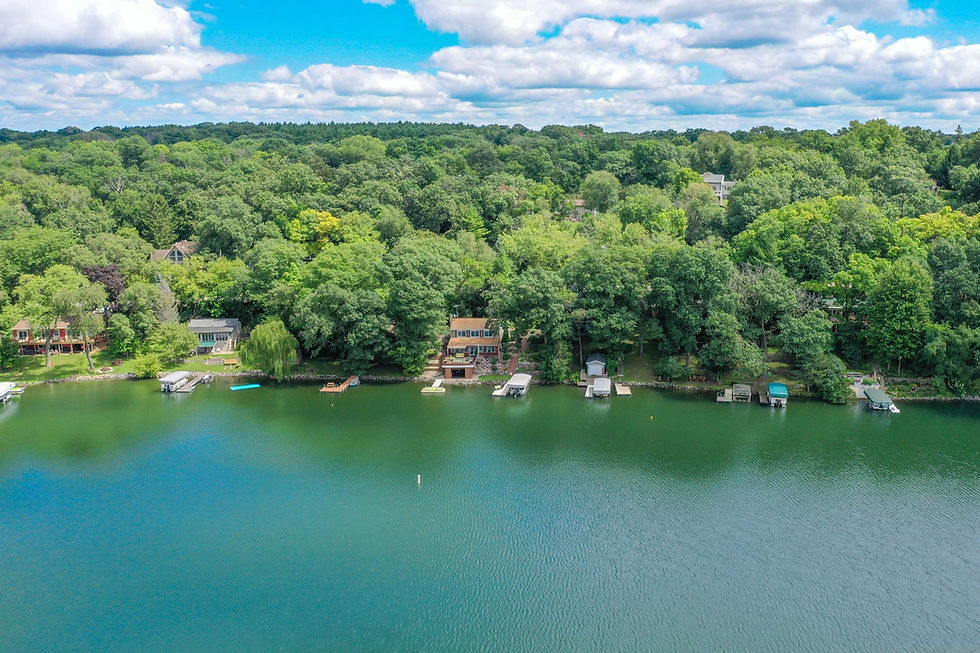10 Tips for Getting Your Lake Home Ready for Winter
- Dec 29, 2023
- 4 min read
Updated: Jan 9, 2024

Your lake home is likely your second home and you will likely visit less often during the winter months. It will often sit empty for weeks on end. When left unoccupied, there is the potential for many issues and headaches including leaks, pipe bursts, vandalism, weather damage, and pests. To help you avoid these headaches, here are 10 tips for getting your lake home ready for winter.
1. Turn off the Water
To prevent leaks, pipe bursts, and other issues, you want to turn off the water.
This may include the following:
Turn off the pump or the main water supply.
Run the faucets to drain the pipes.
Flush the toilet to remove water in the tank.
Shut off water supply lines, especially for the exterior hose faucet.
Disconnect any irrigation or water systems.
Keep the room and cabinet doors open to warm areas so the pipes stay warm.
Even if you leave the heat on low, turning off the water adds an extra layer of protection. In the event of a power outage or broken furnace, turning off the water prevents further problems and damage.
2. Plan Property Checks & Routine Monitoring
An unoccupied house that is not maintained is prime for vandalism, costly emergencies, and other issues. To avoid this, you want to plan for property checks & routine monitoring. Ask a full-time neighbor to keep an eye on your house and text/call you if they notice anything out of the ordinary (ex: foggy windows, suspicious car or activity, weather damage, etc.). Or hire a home concierge service or property manager to check on your house every so often.
3. Close & Seal Up the House
Make sure to seal up your lake home from the cold winter temperatures. Close and lock all windows before leaving. You may also want to weatherstrip your storm doors and weatherstrip/caulk your windows to prevent cold air from sneaking in while also lowering energy bills. Also, make sure to close your fireplace flue. You may also consider a cover for the fireplace or a flue balloon.
4. Leave the Heat On
Unless you fully winterize your house for no activity, you will want to leave your heat on to prevent the pipes from freezing. The right temperature will depend on a few factors including the size of your home, its layout, how long you are gone, what is inside your home, etc. In general, the recommendation is turn down your heat somewhere between 55-60 degrees. It can be helpful to have a smart thermostat so that you can monitor and adjust the temperature remotely.
5. Empty the Refrigerator, Pantry, & Cabinets
Before you leave, make sure to clean out the refrigerator, pantry, and cabinets. Remove any open food and make sure anything that remains is sealed in an air-tight container. Also, wipe down the tables and counters to make sure no traces of food remain. If you leave any food behind, you may find unwanted guests when you return.
6. Critter Prevention & Management
No one wants a mouse in the house. However, mice and other pests will be looking for a warm place and food source. Take a proactive approach with mice traps and/or poison so that you have something in place to catch any that may enter. It is better to find one in a trap than running across your floor.
7. Give the Appearance Your Home Is Occupied
Snow removal, mail management, and leaving a light on are all ways of giving the appearance your home is occupied to help reduce the risk of theft or vandalism.
Plan for snow removal and hire a company to plow your driveway. If you receive mail at your lake home, you will want to plan to forward your mail to your primary address or put it on hold until you return. Also, ask a neighbor to keep an eye out for any mailings that may show up on your door or property.
Consider leaving the light on by your front door or investing in motion-activated lights. Solar lights are an inexpensive way to light up the exterior of your house. A timer can be used to turn on interior lights after dark.
8. Prepare the Roof, Gutters, & Furnace
To prevent surprises, it is always a good idea to check your roof for leaks, clean the gutters to prevent ice dams, and to check your furnace regularly. Make it a priority in fall before you close up for winter.
9. Consider a Security System or Remote Monitoring
Whether you go with a full security system like ADT or a Ring Doorbell for remote monitoring, it can give you peace of mind when you are away and help prevent potential theft and vandalism.
10. Have an Emergency Plan
Strong winds, a tornado, or a snow squall have all happened during the winter months at Whitewater & Rice Lake. Make sure your neighbors have your contact information to keep you informed of any property damage.
These 10 tips for getting your lake home ready for winter will help you avoid problems and keep your lake home in good shape, so it is ready for you when you return.




Comments